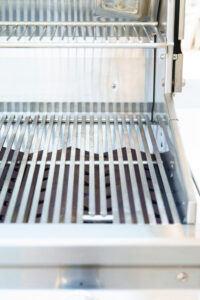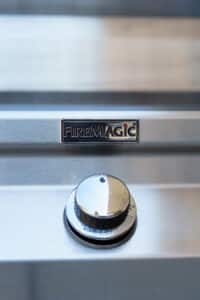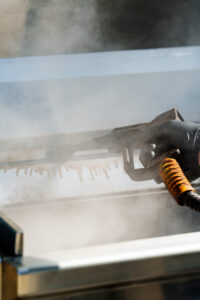Introduction
Keeping your grill clean isn’t just about looks — it directly impacts performance, safety, and the flavor of your food. While brushes and scrapers are the most common tools, many grill owners are discovering another option: the grill cleaning brick.
Made from abrasive, non-toxic materials, grill cleaning bricks are designed to tackle tough, baked-on grease and carbon buildup. They can be incredibly effective when used correctly, but like any cleaning tool, they aren’t ideal for every surface or situation.
In this guide, we’ll break down what grill cleaning bricks are, when to use them, and how to handle them safely so you can decide if they deserve a spot in your cleaning routine.
What Exactly Is a Grill Cleaning Brick?
A grill cleaning brick is a block of abrasive material — often pumice stone, recycled glass, or a synthetic alternative — that scrubs away layers of grease and carbon without the need for chemicals. Unlike a brush, which relies on bristles, the brick slowly wears down as you use it, conforming to the shape of your grill grates over time.
How they differ from other tools:
- Unlike brushes, there are no bristles to shed, which eliminates the risk of stray metal ending up in your food.
- Compared to scrapers, they cover more surface area and mold to your grates as you go.
- They’re chemical-free, so you don’t have to worry about residues from cleaning products.
Key benefits:
- Safe for cast iron and stainless steel grates
- Effective at removing heavy carbon buildup
- Non-toxic and food-safe
Grill cleaning bricks are especially popular with commercial kitchens and heavy grill users who deal with thick buildup that a brush can’t easily remove.
When to Use a Cleaning Brick
Grill cleaning bricks are best suited for certain situations. They’re not an everyday tool, but they shine when you’re dealing with stubborn buildup.
Best uses:
- Heavy carbon deposits – After a long cook or if you’ve skipped a few cleanings, bricks can cut through thick layers of char and grease that brushes struggle with.
- Stainless steel and cast iron grates – These surfaces can handle the abrasive texture of the brick without damage.
- Flat-top griddles or planchas – Bricks are excellent for scraping and polishing large, flat cooking surfaces.
When not to use them:
- Porcelain-coated grates – The abrasive surface can chip or scratch the coating, exposing bare metal underneath and accelerating rust.
- Light routine cleaning – Bricks wear down quickly, so they’re better saved for heavy-duty jobs rather than daily upkeep.
If you have porcelain-coated grates, stick with softer brass brushes or nylon pads. Save the brick for tougher surfaces that can handle it.
How to Use a Grill Cleaning Brick Safely
Using a grill cleaning brick is simple, but technique matters if you want to avoid unnecessary wear or damage. Here’s the safest way to do it:
Step 1: Heat the grill lightly
Warm the grill for a few minutes, then turn it off. You want the grates warm enough to loosen residue, but not so hot that the brick melts or crumbles too quickly.
Step 2: Hold the brick firmly
Grip the brick with gloves or a grill-safe handle, especially if the grates are still warm.
Step 3: Scrub in one direction
Press the brick against the grates and scrub along their length. As the brick wears down, it will form grooves that match your grate pattern, making it more effective over time.
Step 4: Rinse and wipe
After scrubbing, rinse the grates with warm water or wipe them with a damp cloth to remove any remaining dust from the brick.
Step 5: Oil the grates
Finish by coating the grates with a high-smoke-point oil to protect the surface and prevent new rust from forming.
Used this way, a cleaning brick can safely restore your grates without the risks associated with shedding bristles or harsh chemicals.
Pros and Cons of Grill Cleaning Bricks
Like any cleaning tool, grill bricks have strengths and weaknesses. Knowing both helps you decide whether they’re right for your grill.
Pros:
- Highly effective on tough buildup – They cut through grease and carbon faster than most brushes.
- No bristles – You don’t have to worry about dangerous metal bristles ending up in your food.
- Custom fit – As they wear down, bricks naturally mold to the shape of your grates, making them more effective over time.
- Food-safe and chemical-free – Most bricks are made from pumice or recycled materials that don’t leave behind harmful residues.
Cons:
- Not universal – They can damage porcelain-coated grates or delicate surfaces.
- Wear out quickly – A brick shrinks with each use and often doesn’t last as long as a brush or scraper.
- Messy to handle – Bricks create dust as they wear down, which needs to be rinsed or wiped away.
Overall, grill cleaning bricks are best kept as a heavy-duty tool — great to have on hand for stubborn messes, but not always the everyday choice.
Alternatives and Professional Options
If a cleaning brick doesn’t sound like the right fit, there are other tools and methods that might work better for your grill.
- Brushes – Stainless steel, brass, or nylon brushes are staples for regular upkeep. Just make sure to replace them before they shed or wear out.
- Scrapers and pads – Simple tools that can handle lighter messes quickly without wearing down like a brick.
- Steam cleaning – Steam is one of the safest and most effective ways to sanitize and degrease a grill without chemicals. Handheld steamers are available, but they often lack power for heavy buildup. That’s why many homeowners choose Fire & Metal’s professional cleaning service, which restores grills thoroughly and safely.
Conclusion
A grill cleaning brick is one of the most effective tools for tackling heavy carbon buildup. It’s simple, affordable, and safer than cheap wire brushes — but it’s not a perfect solution for every grill. Bricks shine on stainless steel and cast iron but can damage porcelain coatings if used incorrectly.
TL;DR: Use a grill cleaning brick when you need to cut through stubborn grease or restore neglected grates. Stick with brushes, scrapers, or steam cleaning for routine care, and avoid using bricks on delicate coated surfaces.
For a full breakdown of other cleaning options, our post on the best grill cleaning tools compares brushes, pads, and steam so you can choose what’s right for your grill.
When your grill needs more than a quick scrub, Fire & Metal’s professional steam cleaning service is the safest way to restore performance without risking damage.






